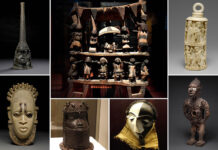Mercy Corps, a Non-governmental Organisation (NGO), has concluded its peace-building and enlightenment programme targeted at victims of insurgency in the North East.
The News Agency of Nigeria (NAN) reports that the initiative is aimed at improving security, reducing support for violence and building the capacity of citizens to hold government accountable in communities hit by the insurgency in Borno.
The programme also supported target communities to become more peaceful and resilient to the drivers of conflict and violence, including recruitment into the insurgency.
The Nigeria Director of the NGO, Ndubuisi Anyanwu, said the programme was implemented in 21 communities in the North East, with over 1,000 people benefiting from different categories of training and empowerment.
Speaking at a ceremony to mark the official completion of the initiative, Anyanwu said that the programme tagged “Northeast Conflict Management and Stabilisation (NE-CMS), also targeted traditional and religious leaders.
He said that the initiative sought solutions to several complex issues that were fuelling the prolonged crisis in the region, from unsatisfactory relations between citizens and government as well as traditional systems of exclusion.
“Our pre-implementation assessment observed deep tensions from social and political conflicts within local communities, including inter-ethnic, intergenerational, and IDP-host communities’ conflicts resulting in economic exclusion.
“In order to ensure lasting peace, we worked closely with key stakeholders to strengthen and establish several channels for discourse between the government, the military, community leaders and the people towards improving the security situation and protection for the people of Borno State,” he said.
He pointed out that the Mercy Corps based the initiative on certain building blocks which included: fair power structure, conflict resolution mechanisms by supporting social inclusion through dialogue and effective institutions by working with civilian governments
According to Anyanwu, the programme was also based on a supportive regional environment as well as inclusive economic development by leveraging on synergies with other mercy corps led programmes.
“Community structures were established across 21 communities including the good governance committee, conflict management committee, youth support networks, women councils, psycho-social support groups and protection committee.
“We are truly proud of the achievement of the NE-CMS programme, the citizens are now more civically engaged, security forces now have improved capacities to protect civilians, while communities also demonstrate improved trust.
“We had over 500 traditional and religious leaders participate in capacity building sessions on the use of alternative narrative as a framework for dialogue, trust-building and reconciliation.
“We were also able to train 1,200 youths and women on topics related to leadership,” he said.
He pointed out that the feat could not have been possible without the aid of other partners including the Centre for Civilians in Conflict, Okapi Consulting, Centre for Humanitarian Development, among others.
Explaining the initiative, Paul Enude, Deputy Programme Manager of the NE-CMS programme said that the programme was designed and implemented in such a way that there would be sustainability.
“We put together a robust sustainability plan; it started from the inception with the programme design up to the close-out phase.
“Mercy Corps trained community participant in requisite dialogue skills. Right now they are engaging within themselves in the community and also holding dialogue sessions without the presence of Mercy Corps.
“We have been able to go an extra mile to train them on how to engage the government with the requisite advocacy skills,” he said.
He said that the skills had been able to support them in demanding service delivery, pointing out that the benefitting communities have been able to get certain basic amenities from the government using those skills.
Enude added that other communities who were not direct beneficiaries were now replicating the structures which had been set up in the target communities.
He added that Mercy Corps had generated meaningful buy-in from representatives in the House of Assembly, Ministry of Local Government and Chieftaincy Affairs, and Directors of Planning.
Also Speaking, Abba Monguno, Chairman of the Conflict Management Committee, one of the committees established by Mercy Corps, commended the Corps for the efforts in the North East.
He said that Mercy Corps was the first to reach out to the communities after the insurgency, adding that the training they have received has positioned them to dialogue better for peace-building.
Monguno, who works in the Borno State House of Assembly, also pointed out that the training of representatives and as well as the liaison established with the people will also ensure the enactment of better laws.
Follow the Neptune Prime channel on WhatsApp:
Do you have breaking news, interview request, opinion, suggestion, or want your event covered? Email us at neptuneprime2233@gmail.com





